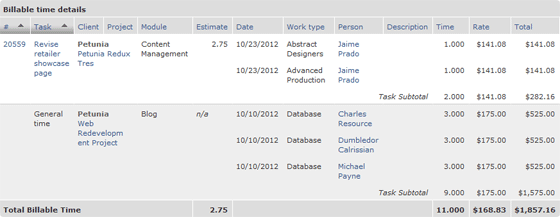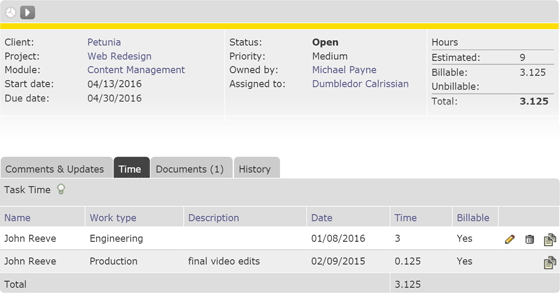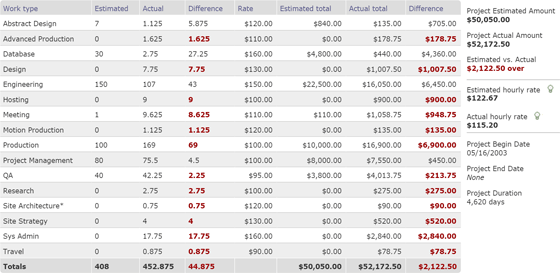![]()
In this post…
Most creative agencies understand that time tracking data is a critical component in managing projects more efficiently and in making better business decisions. And, when an agency embraces time tracking to the point they track time on individual tasks, they end up with a trove of detailed, indispensable data. To demonstrate how valuable this data can be, here are 5 reasons why task management and time tracking are like two peas in a pod. We’ve included examples from our online time tracking and task management software, Intervals, to illustrate each one.
Detailed Reporting and Billing

Detailed reports will show exactly where your time is going, and a breakdown of billable hours by task.
Whether or not you are billing hourly it’s always good to know exactly where your time is going. It’s not uncommon for a client to ask “what’s taking so long?” or “where did all my budget go?” If you’ve been tracking your time on individual tasks you can answer these questions very quickly. Simply run a report to show how much time was spent on each task. In our experience, such a report quickly puts a clients concern at ease because it gives them two important pieces of information. First, it shows what tasks you’ve been spending your time working on. And second, it shows how smaller time entries add up quickly.
Compare Estimated Time to Actual Time

Each task can keep track of the time spent working on them compared to the original estimate. Use this data to fine tune future project estimates.
Estimating how much time a task is going to require, and how much time it actually takes to complete, can sometimes be polar opposites. When we first estimate a task we just don’t know how it’s going to unfold. Tracking the original estimated time and the final actual time gives us a trove of information. We can look back on a project and dive into the data to see exactly where it went wrong — finding out exactly which tasks put the project over budget. And we can use that data to avoid making the same mistakes on the next project.
More Accurate Estimating

Revisit the estimated and actual time data to see exactly where the project went over budget. Use that information to estimate your next project more accurately.
Accurately estimating a project is difficult but important if you are going to avoid going over budget. Tracking project time against individual tasks makes the estimating process much easier. Projects are broken down into tasks because it makes them easier to manage, and because most agency projects have similar tasks to one another. This breakdown also makes projects easier to estimate. For example, installing WordPress is going to take the same amount of time regardless of the project. If estimating a project with a WordPress component, we can look up how much time these tasks have required in the past and put our most accurate estimate forward.
Resource Allocation

The resource allocation report shows how many hours are currently allocated to each task assignee. The report also provides details about each task and can be filtered by project, milestone, assignee, and more.
Your team can easily get overwhelmed when the tasks begin to pile up. Delegating tasks requires careful planning to avoid weighting tasks unfairly. Estimating how long a task will take is one of the more important variables in the equation. Once we know that we can begin assigning tasks across the team using the estimated number of hours to distribute them evenly. As the team begins tracking their time against each task we start accumulating data we can use to fine tune the project plan.
Scrum and Sprint Planning

Use estimated time when planning sprints to assign the right number of stories for your team’s velocity. Then use actual time to track sprint progress and performance.
If you practice Agile methodologies, especially Scrum, tracking time on tasks can be extremely helpful for sprint planning. Time tracking, at a high level, provides the data needed to extrapolate our team’s velocity. If we can calculate the average number of hours our team can knock out in a week, we shall know their velocity. The other piece of the sprint planning puzzle is knowing how much time a task requires. If we can calculate these two data points, we will know how many tasks we can fit into our next sprint.
How to Get Started
Create an Intervals account and take it for a test drive. We offer free 30 day trial accounts. No credit card is required and the account is fully functional. Plug in your data and start crunching the numbers to see if Intervals time tracking and task management features are right for you.
Photo credit: Jess Pac



